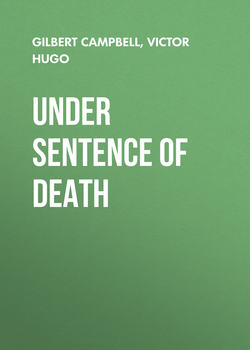Читать книгу Under Sentence of Death - Виктор Мари Гюго, Clara Inés Bravo Villarreal - Страница 41
UNDER SENTENCE OF DEATH
CHAPTER XLI
ОглавлениеShe is young and rosy, and has large eyes; she is a pretty child.
She wears a dear little dress that becomes her well.
I have taken her up in my arms, and placed her upon my knees, and kissed her hair.
Why is her mother not with her? She is ill, and her grandmother is ill too.
She gazed upon me with an air of astonishment; she permitted me to caress her, embrace her, and devour her with kisses, but from time to time she cast an uneasy look at her nurse, who was weeping in a corner of the room.
At last I was able to speak.
“Marie!” said I. “My little Marie!”
I pressed her tightly to my bosom; she pushed me away with a low cry.
“Oh, sir,” said she, “you hurt me.”
Sir! It was nearly a year since she had seen me. She had forgotten me. Words, face, speech, all were faded from her memory; and who would recognize me in this dress, with my beard and my livid complexion? Was I lost to the only one that I should have cared to remember me?
To be no more a father—to be condemned never to hear that word again from the lips of a child, that word which is so sweet, but which a man’s tongue cannot frame, “Papa.”
And yet to hear it once again from those lips, only once again, I would gladly have given the forty years of life that they were going to take away from me.
“Listen, Marie,” said I, joining her two little hands in mine. “Do you not know me?”
She looked at me with her beautiful eyes, and answered—“No.”
“Look at me well,” urged I. “Now who am I?”
“You are a gentleman,” replied she.
Alas! to love one creature so fondly in the world—to love her with all your passionate love, to have her with you to look into her eyes, and to hear her answer that she does not know you.
“Marie,” continued I, “have you a papa?”
“Yes, sir,” said the child.
“Well, where is he?”
She raised her great eyes full of wonder.
“Do you not know?” said she. “He is dead!”
Then she began to cry, and I almost let her fall.
“Dead,” repeated I. “Marie, do you know what it is to be dead?”
“Yes, sir,” answered she; “it is to be in the churchyard, and in heaven.”
Then she continued, “I pray to the good God for him night and morning at mamma’s knees.”
I kissed her forehead.
“Marie, say your prayers.”
“I must not, sir; prayers must not be said in the middle of the day; come this evening and I will say them to you.”
This was too much, and I interrupted her.
“Marie, it is I that am your papa.”
“Oh,” answered she.
I added—
“Do you not wish that I should be your papa?”
I covered her with tears and kisses. She endeavoured to disengage herself from my embrace, crying—
“Your beard hurts me.”
Then I put her once more upon my knees, and, looking into her eyes, asked her—
“Marie, do you know how to read?”
“Yes,” answered she, “I can read; mamma taught me my letters.”
“Come, read a little,” said I, showing her a paper that she had crumpled up in her hand.
She shook her little head.
“I can only read fables,” said she.
“Never mind, try, come, let us see.”
She unfolded the paper, and began to spell it out, pointing to each letter with her finger.
“S, E, N, sen; T, E, N, C, E–”
I snatched it from her hand. It was the sentence of death that she was reading to me, and her nurse had bought the paper for a penny. It would cost me more than that.
No words can describe my feelings. My violence frightened the child. She almost wept. Suddenly she exclaimed, “Give me back my piece of paper; I want it for a plaything.”
I gave her to the nurse. “Take her away,” I cried. Then I fell back in my chair, gloomy, worn-out, and desperate. Let them come now, I care for nothing; the last link that binds me to life is broken, they can do what they like with me.
